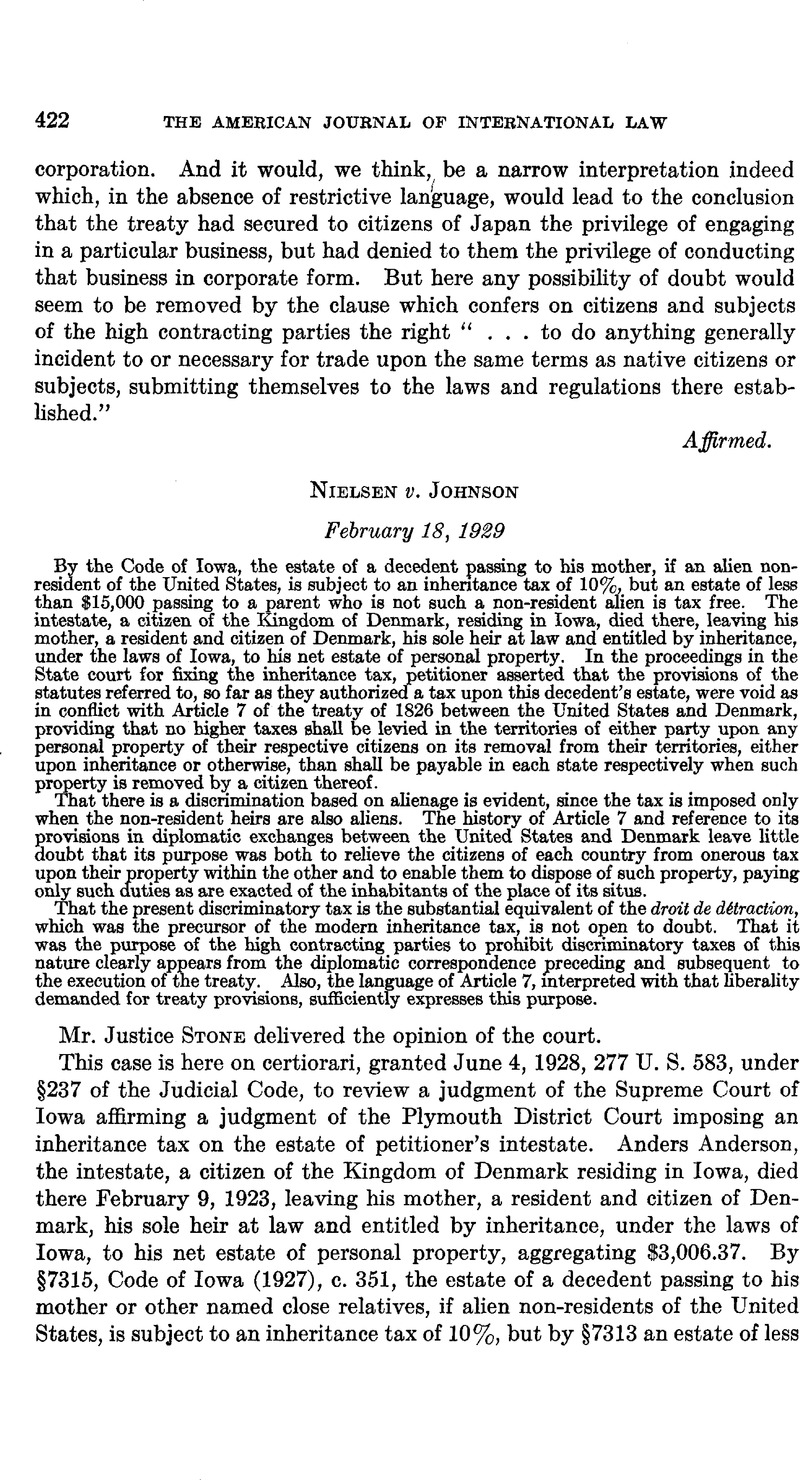Article contents
Nielsen v. Johnson
Published online by Cambridge University Press: 04 May 2017
Abstract

- Type
- Judicial Decisions Involving Questions of International Law
- Information
- Copyright
- Copyright © American Society of International Law 1929
References
1 “Their Britannick and Danish Majesties mutually agree, that no higher or other Duties shall be levied, in either of Their Dominions … upon any personal property of Their respective Subjects, on the removal of the same from the Dominions of Their said Majesties reciprocally, (either upon the inheritance of such property, or otherwise,) than are or shall be payable in each State, upon the like property, when removed by a Subject of such State, respectively.“ 12 British and Foreign State Papers, 1824–1825 (1826) 49. Article 40 of the Treaty of Commerce and Navigation, concluded between France andDenmark, August 23, 1742, provided that the citizens of each of the two countries reciprocally should be exempt in the other from the droit d‘aubaine or other similar disability, under whatever name, and that their heirs should succeed to their property without impediment. 1 Coercq, Recueil des Traites de la France (1864) 57.
2 The droit de détraction was derived from the droit d’aubaine, one of the many harsh feudal laws and customs directed against strangers and which, in its narrowest sense, was the right of the sovereign, as successor of the feudal lords, to appropriate all the property of a nonnaturalized alien dying, either testate or intestate, within the realm. 1 Calvo, Dictionnaire de Droit International (1885) 67, Aubaine; 1 Merlin, Répertoire de Jurisprudence (Sth Ed. 1827) 523, Aubaine; Halleck, International Law (1861) 155; 2 Ferriere, Oeuvres de Bacquet (1778) 8, et seq. This right was exercised to the exclusion of all heirs whether they were citizens or aliens or resided within or without the realm, with the single exception of resident legitimate offspring, and continued to be exercised long after aliens had been accorded unrestricted power of disposition of goods inter vivos. Demangeat, Historie de la Condition Civile des Étrangers en France (1844) 110, 125; Loisel, Institutes Contumiers, Liv. 1, régle 50. The term has, however, sometimes been applied to all the varying disabilities of aliens, Fiore, Le Droit International Privé (1907) 14, and more often used to include not only the inability of the alien to transmit but the complementary incapacity of an alien to inherit, even from a citizen. Merlin, supra, Aubaine.
But commercial expediency led, at an early date, to a mitigation of the rigors of the droit d’aubaine. This process took several forms, the exemption of alien merchants in certain trading centers, of certain classes of individuals (ex-soldiers, etc.) and, most prominently, treaties providing for its reciprocal abandonment or contraction. In these treaties, the droit de détraction was recognized as a tax, of from five to twenty, usually ten, per cent of the value, imposed on the right of an alien to acquire by inheritance (testate or intestate) the property of persons dying within the realm. Demangeat, supra, at 219, 225; 2 Massé, Le Droit Commercial (1844) 14; 1 Calvo, supra, Détraction; Fuzier-Herman, Répertoire Général Alphabétique du Droit Francaise (1890) Aubaine, 6; Guyot, Répertoire de Jurisprudence (1785) Détraction; Merlin, supra, Détraction. Oppenheim, International Law (4th Ed. 1928) 560; Halleck, supra, at 155; Wheaton, Elements of International Law (8th Ed. 1866) 138. The droit d’aubaine and the droit de détraction were abolished in France by decrees of the Assembly in 1790 and 1791, but subsequently reappeared in the Civil Code, Arts. 726, 912, with provision for abandonment as to a nation according similar treatment to French nationals. They were again abolished, with certain protective provisions for French heirs, by the Law of July 14, 1819. See Dalloz, Répertoire Pratique (1825) Succession; Demangeat, supra, at 239, et seq; and citations, supra.
3 “C’est un droit par lequel le souverain distrait à son profit une certaine partie de succession qu’il permet aux étrangers de venir receueiller dans ses états.” 4 Merlin, supra, 518, Détraction; Guyot, supra, Détraction. “Ce droit … consistait dans un préléVement opéré1 par le gouverment … sur le produit net des successions transférés à l’étranger.” Calvo, supra, Détraction; see also Fuzier-Herman, Répertoire Général du Droit Française (1890) Aubaine, 6.
4 A number of early treaties of the United States clearly recognize this essential characteristic of the droit de détraction, either by providing in terms for the abolition of both removal duties and the droit de détraction, cf. Treaties with: France of 1778, 2 R. S. 203, 206; Wurttemberg of 1844, 2 R. S. 809; Saxony of 1845, 2 R. S. 690; or by words of similar import. Cf. Treaties with: France of 1853, 2 R. S. 249, 251; Switzerland of 1850, 2 R. S. 748, 749, 750; Honduras of 1864, 2 R. S. 426, 428; Great Britain of 1900, 31 Stat. 1939.
5 “The tax shall be and remain a legal charge against and a hen upon such estate, and any and all the property thereof from the death of the decedent owner until paid.” Iowa Code (1927) c. 351, §7306. See also §§7309, 7363.
- 1
- Cited by




